raised tattoo after a week ? Here’s Why
Raised Tattoo After a Week? 5 Causes and How to Fix It : As you look at your new tattoo, you might notice it’s still a bit swollen. It’s been a week since you got it, and you’re wondering if it’s okay. Don’t worry, raised tattoos are normal. Knowing why it happens can help you take better care of it.
Getting a tattoo is exciting, but the swelling can worry you. It’s natural and part of healing. With the right care, your tattoo will look great and heal well.
Table of Contents
Understanding Raised Tattoos
Getting a new tattoo is exciting, but healing can be tricky. Sometimes, tattoos can look raised or bumpy. This can happen for many reasons, like how your body reacts to the ink or changes in the weather.
What Causes Tattoos to Become Raised?
Tattoo raised skin often comes from an allergic reaction to the ink. Some people might be sensitive to certain colors, causing tattoo swelling, inflammation, and itchiness. Bad tattooing can also hurt the skin, making it scar and look raised.
Common Symptoms of Raised Tattoos
A raised tattoo might also show signs like redness, swelling, itchiness, and scabbing. These signs can mean there’s an infection or allergy that needs quick care.
“Allergic reactions to tattoo inks can lead to raised, irritated, and itchy skin, affecting individuals either right after getting inked or a few days later.”
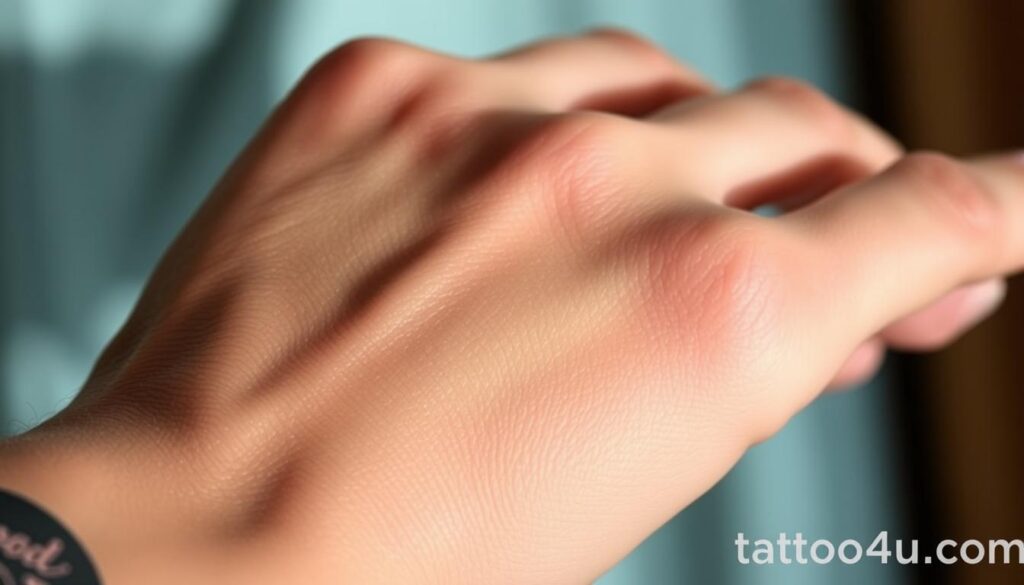
Knowing why tattoos might look raised and what symptoms to watch for is key. It helps keep your tattoo looking good and healthy. By staying informed, you can handle any issues and make sure your tattoo heals well.
Unique Body Chemistry
Not everyone’s body reacts the same way to tattoos. Each person’s body chemistry is unique. This can affect how their skin reacts to tattoo ink.
Things like skin type, immune system, and health play a big role. They can influence how the body reacts to tattoo ink.
Why Your Body Might React to Tattoo Ink
Some people might be more likely to have tattoo ink allergies or tattoo ink reactions. This is because of how their body chemistry interacts with the ink. For example, eczema can flare up from tattoo ink.
Contact dermatitis can also happen. It’s when the immune system reacts to tattoo ink substances.
A 2018 study found that tattoos on mice’s ears had more pigment cells than tattoos on their tails. This shows that where and what kind of ink is used matters.
“All pigments tested triggered macrophages to consume them, with varying levels of activity and some inducing transient tumor necrosis factor secretion.”
A 2022 study looked at how different inks affect immune cells. It found that different inks cause different reactions in the body. Knowing how body chemistry and tattoo ink interact is key for a good tattoo experience.
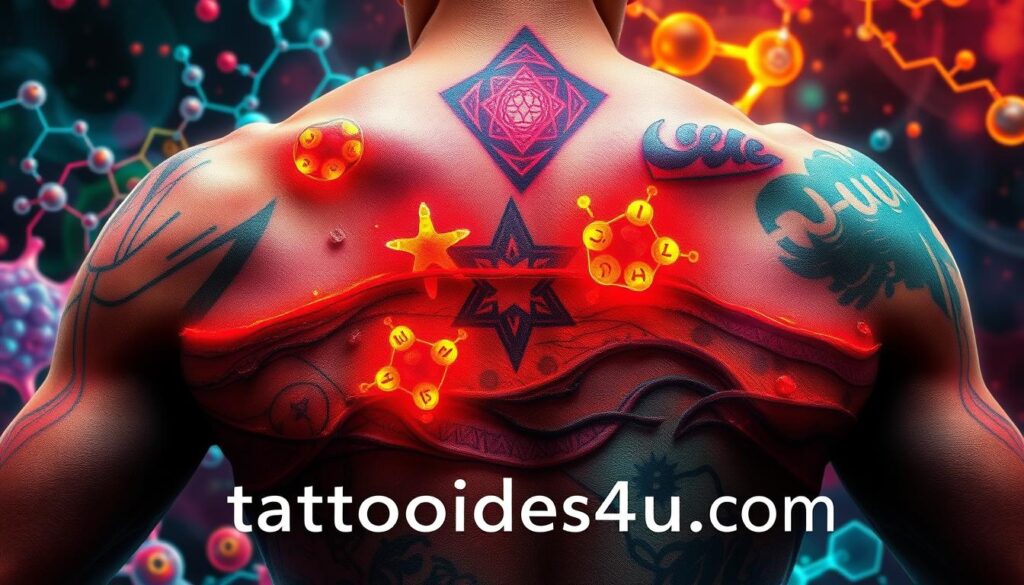
Weather Conditions and Raised Tattoos
The weather can greatly affect your new tattoo. Hot, humid weather can make your tattoo swell and get irritated. Cold, dry weather can cause dehydration and more irritation. It’s key to take good care of your tattoo, like protecting it from the sun and keeping it moisturized.
How Hot Weather Affects Tattoo Swelling
Hot and humid weather can make your tattoo swell and get irritated. The heat and moisture can make the skin swell, putting extra pressure on the tattoo. To lessen swelling, keep the area cool and clean. Use a fragrance-free, hypoallergenic moisturizer to keep the skin moist.
The Impact of Cold Weather on Tattoos
Cold, dry weather can also harm your tattoo. The cold and lack of moisture can dry out the skin, causing irritation and healing problems. To fight cold weather effects, keep your tattoo moisturized and shield it from the elements.
No matter the weather, following proper tattoo aftercare is crucial. Wash the tattoo gently with mild, unscented soap. Apply a thin layer of recommended ointment. Avoid activities that might irritate the area. These steps can help minimize tattoo swelling and tattoo irritation, even in different weather.
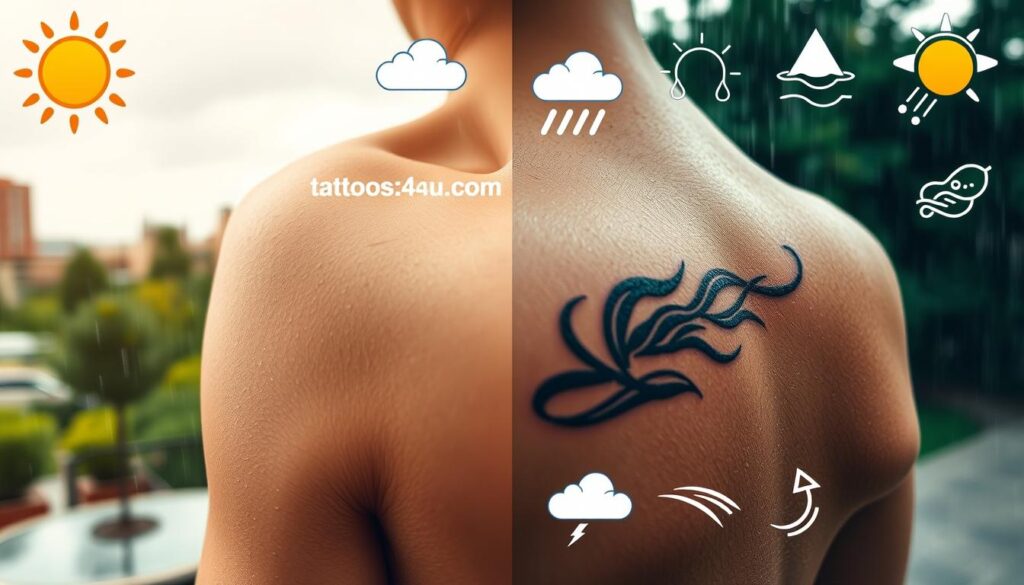
Swelling and the Healing Process
Swelling is a normal part of the tattoo healing process. It makes the tattoo look raised. This swelling is your body’s way of protecting the area and starting the healing.
Treating Swollen Tattoos
If your tattoo is swollen, gently icing it can help. This reduces inflammation and eases pain. It’s crucial not to touch or pick at the tattoo. Doing so can make swelling last longer and slow healing.
If swelling doesn’t go away in a few days, see a doctor. Long-lasting swelling might mean an infection or allergic reaction. These need quick treatment to heal your tattoo right.
By tackling swelling early and following your artist’s care tips, your tattoo will heal well. Remember, being patient and taking good care are essential during this healing stage.
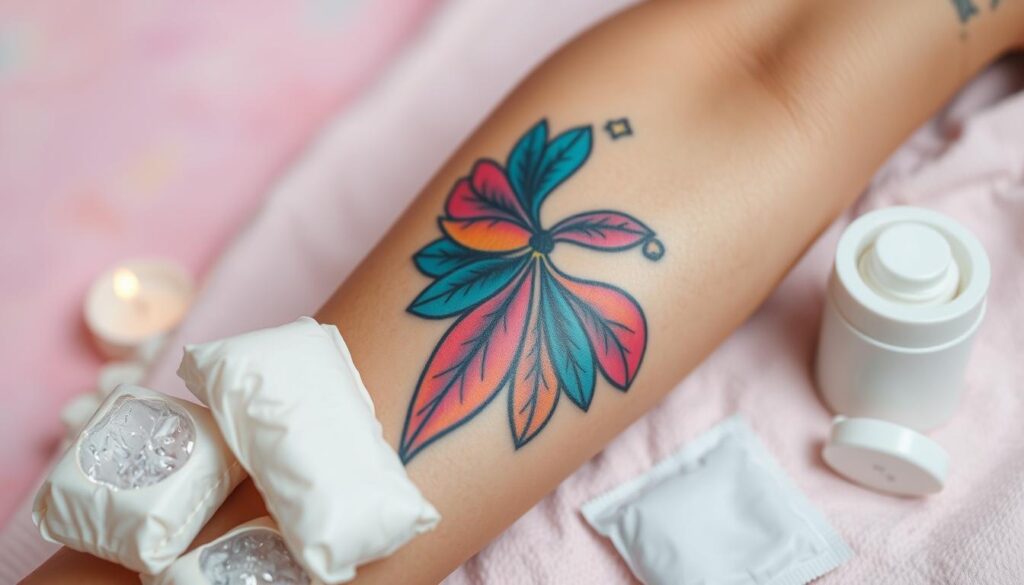
Allergic Reactions to Tattoo Ink
Getting a tattoo is exciting and personal. But, it’s key to know the risks, like allergic reactions to the ink. Colors like red and yellow often cause these allergies, leading to itchy, irritated skin.
Identifying Tattoo Ink Allergies
Allergic reactions to tattoo ink happen when ink stays in the skin. This makes the skin more sensitive. Signs include itchiness, lumps, and sometimes a rash. If you notice these, see a dermatologist to find out which ink is the culprit.
Managing Allergic Reactions to Tattoos
To deal with an allergic reaction, start with ointments or antihistamines. They can ease itchiness and swelling. For worse cases, you might need stronger meds or laser removal. Staying away from things like fragrances and alcohol can also help.
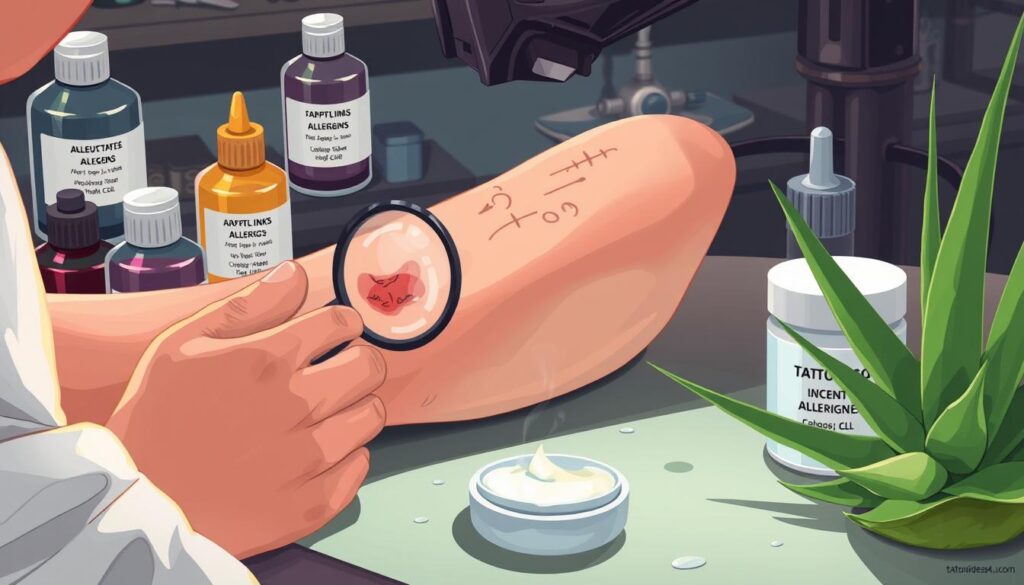
Some people might get an ink allergy years later. Keeping your tattooed skin protected from the sun is vital. Use SPF 30 or higher to keep your tattoo looking good and prevent fading or sensitivity.
If your tattoo suddenly gets very red, swollen, or has pus, get help fast. Tattoos can get infected, like with Staph Aureus bacteria.
Scarring and Raised Tattoos
Getting a tattoo is exciting, but sometimes the skin reacts in ways that can make it look raised or scarred. This might happen because of how the tattoo artist worked or how your body heals. While you can’t always get rid of scarring, there are ways to make your tattoo look better.
Tattoo scarring can happen if the tattoo artist didn’t do it right or if you didn’t take good care of it after. If your tattoo is still raised after a week, it could mean your body is reacting to the ink. But, this usually goes away in 3 days as your skin gets used to it.
If the raised tattoo scarring doesn’t go away, getting a tattoo touch-up or using moisturizers might help. Even though scarring can last, acting fast and taking good care of your tattoo can make it less noticeable.
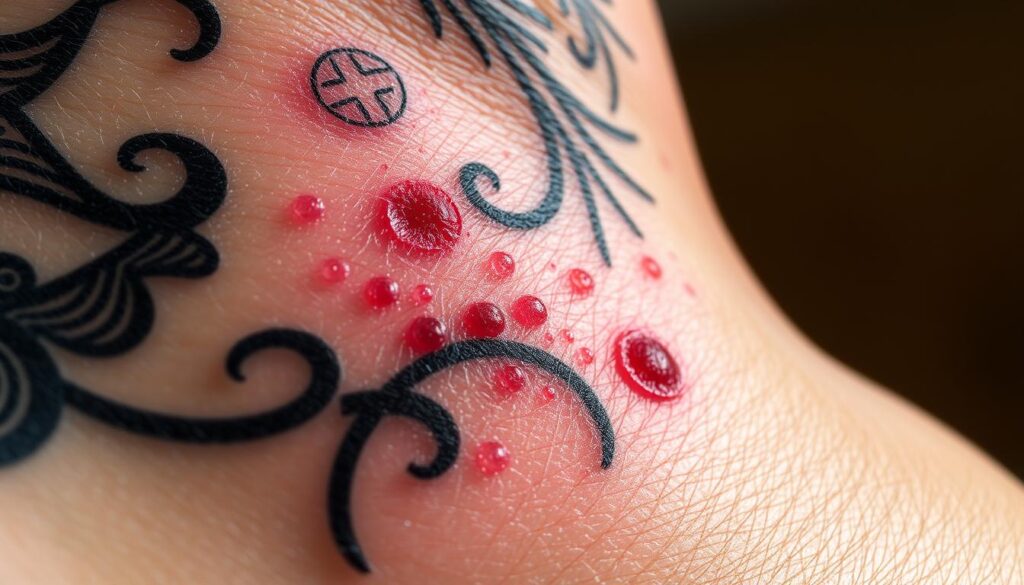
Most tattoos heal without lasting problems. Knowing why scarring happens and taking steps early can help your tattoo look great. Even if it looks a bit raised or scarred while it’s healing, it will likely get better.
raised tattoo after a week
If your tattoo is still raised and shows signs like redness, swelling, and pain, it might be infected. It’s key to take good care of your tattoo to avoid these problems. Clean the tattooed area often and don’t touch it with dirty hands to prevent infections. If an infection happens, seeing a doctor and following their treatment is very important.
One main reason for a raised tattoo is an infection. Bacteria can get into the skin during tattooing, causing swelling, redness, and pain. If not treated, infections can get worse and lead to more serious issues. It’s crucial to act fast to treat infections and help your tattoo heal right.
Preventing Tattoo Infections
To stop tattoo infections, follow your tattoo artist’s aftercare advice. This usually means keeping the tattoo clean, using ointment, and avoiding too much sun or water. Also, wash your hands before touching your tattoo to keep it clean.
If you see signs of infection like more redness, swelling, or pus, get medical help right away. Your doctor might give you antibiotics or other treatments to fix the infection and help your tattoo heal safely.
Treating Tattoo Infections
If you get a tattoo infection, listen to your doctor’s advice. This might include taking antibiotics, using special ointments, and keeping the area clean and covered. Don’t pick or scratch the tattoo, as this can make the infection worse and cause scars.
With the right care, most tattoo infections can be treated well, and your tattoo can heal without lasting problems. By being proactive in preventing and treating issues, your new tattoo will look great and last for many years.
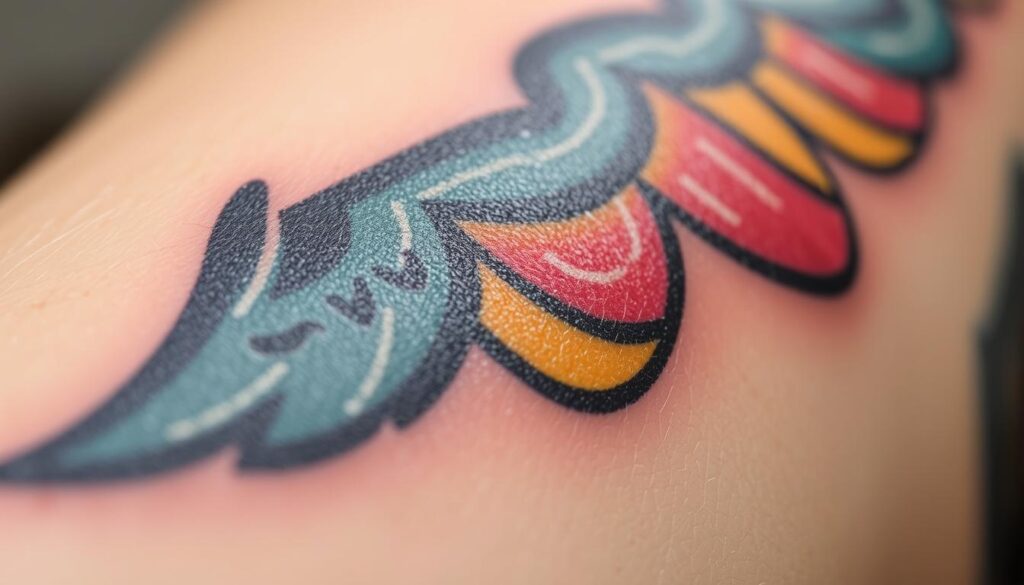
Proper Tattoo Aftercare
Proper tattoo aftercare is key for healthy healing and avoiding issues like raised or irritated tattoos. By following a few simple rules, your new tattoo will heal well and look great.
Dos for New Tattoos
Wash gently: Clean the tattoo with mild soap and warm water. Be gentle to avoid damaging the skin.
Keep it moisturized: Apply a thin layer of unscented lotion or ointment 2-3 times a day. This keeps the skin from drying out and flaking.
Protect from the sun: Use a high-SPF sunscreen to protect your tattoo from UV rays. This prevents fading and discoloration.
Don’ts for New Tattoos
Avoid submerging: Don’t swim or use hot tubs until your tattoo is fully healed, usually 2-4 weeks.
Don’t pick or scratch: Avoid picking at scabs or scratching itchy skin. This can cause infection and poor healing.
Limit physical activity: Avoid strenuous exercise or activities that could irritate or damage the tattooed skin.
“Following a few simple aftercare steps can help ensure your new tattoo heals properly and looks its best for years to come.”
By following these tattoo aftercare and tattoo healing tips, you can enjoy your new tattoo with confidence. You’ll also avoid any unwanted dos and don’ts for new tattoos.
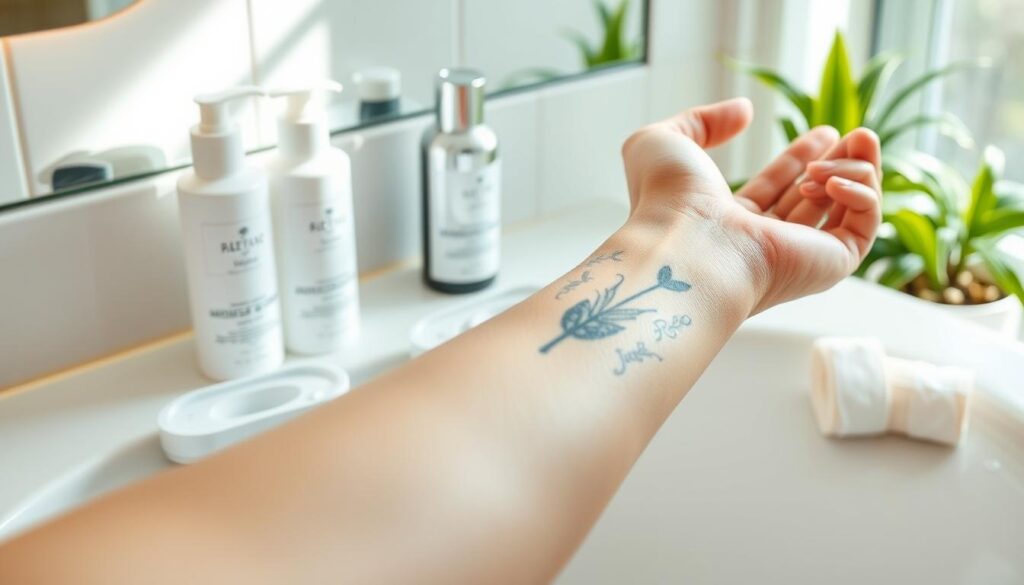
Conclusion
A raised tattoo can happen for many reasons. These include your body’s chemistry, weather, swelling, allergies, scars, and infections. Knowing these causes and following good aftercare can help prevent and manage raised tattoos. If problems don’t go away or get worse, see a healthcare expert.
Healing a tattoo takes at least 2 weeks after getting it. It’s key to keep your tattoo clean, moisturized, and avoid scratching it too much. Scar cover-ups can make scars look more raised at first. But, once healed, scars can become smoother as your skin makes more collagen.
Infections can happen after a tattoo. Watch for signs like pain, heat, redness, itchiness, swelling, and bad smell. If you have these symptoms or feel sick within 48 hours, get medical help right away. Keeping your tattoo clean with antibacterial soap and using ointments as directed can help heal it faster and lower infection risk.







